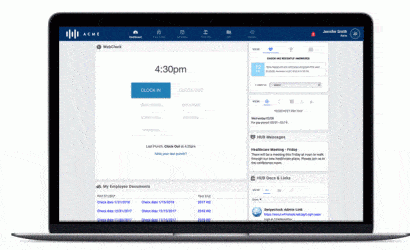Federal and State Pay Stub Law
Updated 10th April 2025 | 5 min read Published 8th July 2019

Understanding pay stubs
Pay stubs, or paycheck stubs, are written statements documenting details of the employee’s wages during a set pay period or schedule. They are an important tool for ensuring employees understand how their wages are calculated and provide transparency about earnings, deductions, and hours worked.
While federal laws don't require employers to provide pay stubs, many U.S. states have their own laws detailing these requirements. Staying compliant with these laws is critical to avoid fines and foster trust within your workforce.
Here's an updated guide on pay stub laws for 2025, with key changes in Illinois and Maryland that businesses operating in the U.S. should be aware of.
Federal payroll stub requirements
What is the Fair Labor Standards Act?
The Fair Labor Standards Act (FLSA) is a federal law which establishes minimum wage, overtime pay eligibility, record-keeping, and child labor standards affecting full-time and part-time workers in the private sector and in federal, state, and local governments.
Although there is no federal law mandating paycheck stubs, the Fair Labor Standards Act (FLSA) requires employers to maintain accurate records of hours worked, wages paid, and other employment data.
These records must be preserved for a minimum of three years and must be open for inspection by the Department of Labor’s representatives, who may ask the employer to make extensions, computations, or transcriptions. For this reason, employers must ensure all documentation is complete and accurate to meet these record-keeping standards.
Who is affected by the Fair Labor Standards Act?
The FLSA applies to most workplaces in the U.S., specifically those involved in interstate commerce or with annual gross sales of $500,000 or more. While federal law doesn’t demand that pay stubs be given to employees, many states enforce this at the local level.
Every employer covered by the FLSA must keep certain records for each non-exempt worker. The Act requires no particular form for the records, but does require that the records include certain identifying information about each employee, as well as data about the hours worked and the wages earned.
The FLSA requires this information to be accurate. Basic records that an employer must maintain include:
- Employee’s full name and social security number
- Address, including zip code
- Birth date, if younger than 19
- Sex and occupation
- Time and day of week when employee’s workweek begins
- Hours worked each day
- Total hours worked each workweek
- Basis on which employee’s wages are paid (e.g., “$9 per hour”, “$440 a week”, “piecework”)
- Regular hourly pay rate
- Total daily or weekly straight-time earnings
- Total overtime earnings for the workweek
- All additions to or deductions from the employee’s wages
- Total wages paid each pay period
- Date of payment and the pay period covered by the payment
Key pay stub law updates for 2025
Illinois pay stub law
Starting January 1, 2025, Illinois employers must provide pay stubs to their employees for each pay period under Public Act 103-0953. Here are the new requirements:
- Transparency: Employers must include information such as hours worked, pay rates, overtime, and deductions.
- Record-keeping: Employers must retain a copy of all pay stubs for three years from the payment date, even if the employee leaves the company.
- Employee Requests: Employees or former employees can request copies of their pay stubs up to two times in a 12-month period.
The Illinois Department of Labor highlights the importance of this law as a way to give employees greater clarity and control over their earnings. Employers should ensure their payroll systems are set up to generate pay stubs that meet these requirements.
Maryland pay stub law
Maryland’s updated rules under Chapter 305, SB 38, took effect on October 1, 2024, but remain a key focus in 2025. They apply to all private-sector employers, regardless of size. Below are the essentials:
Pay Statement Requirements: Employers must provide written or online pay statements each payday, including:
- Employer's name, address, and phone number
- Pay period dates
- Number of hours worked (if applicable)
- Pay rates (including regular and overtime rates)
- Gross and net pay
- Deductions, with explanations
Notice Requirements: Employers must give employees written notice at hire regarding pay rates, paydays, and benefits. Changes in pay rates require advance notice of at least one pay period.
Template Availability: A pay stub template is available from the Maryland Commissioner of Labor and Industry, but its use is optional.
Employers operating in Maryland must also ensure their systems can include this detailed information for their pay statements.
Understanding state pay stub laws
Beyond Illinois and Maryland, state-specific requirements generally fall into these categories:
- No Requirements: States like Georgia and Florida don’t require pay stubs.
- Access States: States like New York and Michigan require employers to make pay stubs accessible, either online or physically.
- Access/Print States: States like California and Texas require that employees can print their electronic pay stubs if requested.
Some states further require employees' consent before switching them to an electronic-only pay stub system (“opt-in states”), while others mandate that employers offer paper pay stubs unless an employee opts for electronic delivery (“opt-out states”).
Pay Stub Requirements by State
No Requirement States
These states do not require employers to provide employees with a pay statement. Delivering a pay stub in electronic or paper format is optional for employers.
- Alabama
- Arkansas
- Florida
- Georgia
- Louisiana
- Mississippi
- Ohio
- South Dakota
- Tennessee
Access States
Employers in these states must provide employees with access to pay information, though not necessarily in physical form. Electronic pay stubs are acceptable, as long as employees can retrieve their information.
- Alaska
- Arizona
- Idaho
- Illinois
- Indiana
- Kansas
- Kentucky
- Maryland
- Michigan
- Missouri
- Montana
- Nebraska
- Nevada
- New Hampshire
- New Jersey
- New York
- North Dakota
- Oklahoma
- Pennsylvania
- Rhode Island
- South Carolina
- Utah
- Virginia
- West Virginia
- Wisconsin
- Wyoming
Access/Print States
These states require employers to provide pay statements that employees can print. Whether delivered electronically or in hard copy, pay stubs must clearly outline pay details.
- California
- Colorado
- Connecticut
- Iowa
- Maine
- Massachusetts
- New Mexico
- North Carolina
- Texas
- Vermont
- Washington
Opt-Out States
States in this category require employee consent for electronic delivery. Employees must be allowed to opt out of electronic pay statements and opt back into paper pay stubs if they choose.
- Delaware
- Minnesota
- Oregon
Opt-In States
In opt-in states, employees must explicitly agree to receive electronic pay stubs. Until consent is given, employers must provide paper or written pay statements.
- Hawaii (remains the only opt-in state)
Payroll compliance tips
To stay compliant with the latest pay stub laws:
- Review State Laws regularly to ensure your practices meet updated requirements.
- Audit Your Records to confirm all required information is present in your pay stubs.
- Retain Documentation for the statutory period, usually three years.
- Update Payroll Systems to ensure they can automatically generate compliant pay stubs.
- Train HR Teams to understand new regulations and handle employee requests for pay stubs.
Failure to comply with pay stub requirements can result in fines. For example, under Maryland law, employers can face penalties of up to $500 per instance for failing to provide compliant pay statements.
Final Thoughts
Whether your business is operating in Illinois, Maryland, or other U.S. states, staying informed about pay stub laws is critical. The changes in Illinois and Maryland emphasize transparency and fairness in employer-employee relationships. By adopting compliant payroll systems and processes, employers can avoid legal pitfalls while creating a culture of trust and accountability in their workplace.




